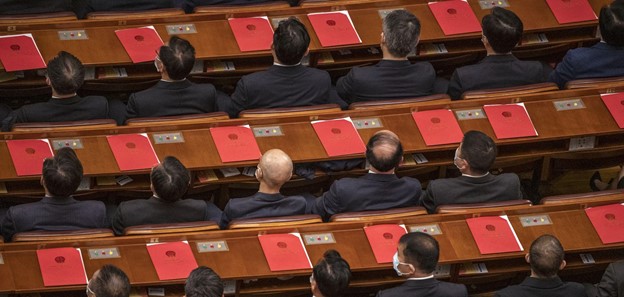
Delegates vote on resolutions during the closing session of China’s National People’s Congress on March 11, 2021.
(Kevin Frayer/Getty Images)
China’s newly approved electoral reforms in Hong Kong will ensure any opposition to mainland encroachment in the city remains marginal and docile by granting pro-Beijing voices more seats, along with the power to veto candidates and vet elected officials. In response, the United States will consider sanctions but is unlikely to go after Hong Kong’s financial sector to avoid escalating tensions with China. On March 11, China’s National People’s Congress (NPC) unanimously approved long-anticipated changes to Hong Kong’s electoral system. These changes notably included mechanisms that will closely vet candidates for elected offices by mainland standards. They also include substantially expanded representation by members of mainland bodies.
- Authorities will establish a new “candidate qualification review committee” tasked with vetting any prospective candidates for the Legislative Council, Election Committee and chief executive post. The committee will consider Article 104 of the Basic Law, which includes swearing allegiance to China, as well as the national security law and the NPC’s standards for lawmakers.
- The Chief Executive Election Committee will expand from the current 1,200 members to 1,500 members, appearing to remove the pro-democracy District Council representatives. Notably, a new fifth sector will add 300 more members to the Election Committee, many of whom pro-Beijing. The members of the added sector will include Hong Kong’s representatives to the National People’s Congress, as well as those to the Chinese People’s Political Consultative Conference (CPPCC) and members of unnamed “related national organizations.” Any chief executive nominees will need 188 nominations (one-eighth), with 15 from each of the committee’s five sectors, ensuring that the pro-Beijing fifth sector cannot be ignored.
- The Legislative Council will also add 20 new lawmakers, bringing its total to 90 seats. Some of these new lawmakers will be chosen by the Chief Executive Election Committee under its new more pro-Beijing configuration. Most notably, the Election Committee will have the power to veto Legislative Council nominees.
Once these reforms are in place in the coming months, China may feel comfortable allowing Hong Kong to move ahead with elections for a new Legislative Council and Chief Executive in order to shore up government legitimacy and to provide a channel for dissent without the risk that the opposition can truly wield power, given the twin checks of the new “review committee” and the national security law. Such a definitive marginalization of the opposition from legislative power, however, risks the reemergence of Hong Kong’s raucous protest movement. Beijing is banking on the deterrent effect of the national security law to quiet these as needed.
- The next steps will see the NPC Standing Committee meet to decide on further details of these reforms and to propose necessary amendments to Annex I and Annex II of the Hong Kong Basic Law, which would take place at the end of March at the earliest.
- March 11 leaks indicate that authorities are considering moving ahead with the Chief Executive Election Committee vote in September, followed by the Legislative Council in December followed by the chief executive election in March 2022.
Given its support for democracy in Hong Kong, the United States will likely impose additional sanctions in response to China’s electoral reforms. But Washington will still proceed cautiously to avoid negative economic repercussions for the United States, as well as the risk of linking the White House’s broader bilateral relationship with China too closely to Hong Kong. Citing the recent electoral reforms, a group of bipartisan U.S. lawmakers urged the White House on March 9 to further pressure the Chinese government to halt the erosion of Hong Kong’s autonomy. But any new sanctions from the administration of U.S. President Joe Biden will likely be shaped to avoid hitting financial institutions with broad international exposure or targeting Hong Kong’s ability to access U.S. dollars.
- On March 3, U.S. Secretary of State Anthony Blinken said the United States will target “those responsible” for individuals committing “repressive acts” in Hong Kong, noting that U.S. companies need to be mindful of already existing sanctions in Hong Kong.
- Blinken and U.S. National Security Adviser Jake Sullivan will meet in person with Chinese counterparts the week of March 15 in Alaska to discuss a range of bilateral topics.
Source: Stratfor, March 11, 2021 |